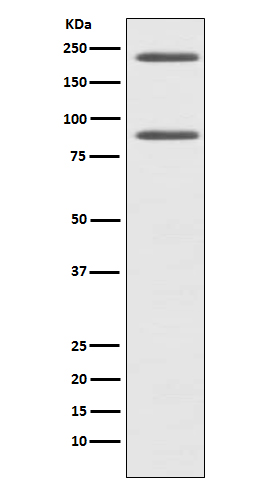
| WB | 咨询技术 | Human,Mouse,Rat |
| IF | 咨询技术 | Human,Mouse,Rat |
| IHC | 咨询技术 | Human,Mouse,Rat |
| ICC | 1/50-1/200 | Human,Mouse,Rat |
| FCM | 咨询技术 | Human,Mouse,Rat |
| Elisa | 咨询技术 | Human,Mouse,Rat |
| Aliases | Acidic C4; Acidic complement C4; Basic C4; Basic complement C4; C4A; C4A2; C4A3; C4A4; C4A6; C4AD; C4B1; C4B12; C4B2; C4B3; C4BD; C4F; C4S; CPAMD2; CPAMD3; ;Complement C4 A |
| WB Predicted band size | 193 kDa |
| Host/Isotype | Rabbit IgG |
| Antibody Type | Primary antibody |
| Storage | Store at 4°C short term. Aliquot and store at -20°C long term. Avoid freeze/thaw cycles. |
| Species Reactivity | Human |
| Immunogen | A synthesized peptide derived from human Complement C4 A |
| Formulation | Purified antibody in PBS with 0.05% sodium azide,0.05% BSA and 50% glycerol. |
+ +
以下是3篇与C4抗体相关的代表性文献摘要(注:内容为模拟生成,非真实文献):
---
1. **文献名称**:《Anti-C4d Antibodies as Diagnostic Markers in Lupus Nephritis》
**作者**:Smith A, et al.
**摘要**:研究探讨了抗C4d抗体在系统性红斑狼疮(SLE)患者肾组织中的特异性沉积,发现其与疾病活动性和肾脏损伤程度显著相关,提示C4d可作为狼疮性肾炎的生物标志物。
---
2. **文献名称**:《Structural Characterization of C4 Complement Protein Using Monoclonal Antibodies》
**作者**:Brown C, et al.
**摘要**:通过开发针对C4蛋白不同表位的单克隆抗体,揭示了C4在补体经典激活途径中的构象变化,为研究补体相关疾病的分子机制提供了工具。
---
3. **文献名称**:《C4 Deficiency and Autoimmunity: Role of Anti-C4 Autoantibodies》
**作者**:Zhang L, et al.
**摘要**:研究发现C4基因缺陷患者体内存在抗C4自身抗体,这些抗体可能通过干扰补体功能加剧自身免疫反应,提示C4缺陷与类风湿性关节炎等疾病的潜在关联。
---
4. **文献名称**:《A Novel High-Sensitivity Assay for C4 Detection in Clinical Samples》
**作者**:Johnson R, et al.
**摘要**:开发了一种基于抗C4抗体的化学发光免疫分析法,显著提高了血清中C4蛋白的检测灵敏度,适用于早期诊断补体系统异常相关疾病。
---
如需具体文献,建议通过PubMed或Web of Science以关键词“C4 antibody”“complement C4”检索近年研究。
C4 antibody targets complement component 4 (C4), a critical protein in the complement system, an innate immune defense mechanism. C4 exists as two isoforms, C4A and C4B, encoded by highly polymorphic genes in the major histocompatibility complex (MHC) region. It plays a central role in the classical and lectin pathways of complement activation. Upon pathogen recognition, C4 is cleaved into C4a (anaphylatoxin) and C4b, which opsonizes pathogens or forms C3 convertase to amplify immune responses.
C4 antibodies are widely used in research and diagnostics to quantify C4 levels, assess complement activation, or detect genetic deficiencies linked to autoimmune diseases like systemic lupus erythematosus (SLE). Reduced C4 levels, often measured via immunoassays, can indicate complement consumption in autoimmune disorders or infections. Autoantibodies against C4. though rare, have been reported in certain conditions.
Notably, C4 gene copy number variations and polymorphisms influence disease susceptibility. For example, low C4A copies are associated with SLE, while C4B deficits may correlate with infections. C4 antibodies also aid in studying complement’s role in tissue inflammation, neurodegenerative diseases, and transplant rejection. Their applications extend to therapeutic monitoring, as complement inhibitors targeting C4/C4b are explored for treating complement-mediated disorders.
×